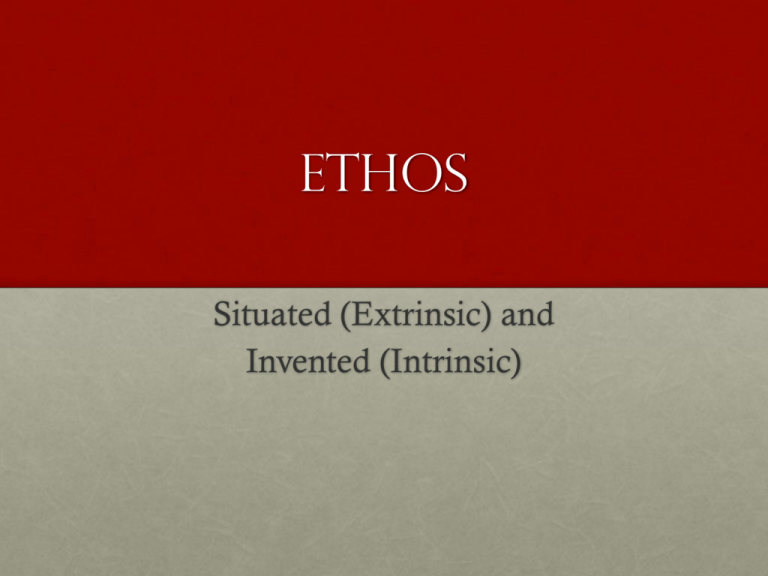
Ethos
Situated (Extrinsic) and
Invented (Intrinsic)
Ethos
Is ethos more about people’s true character
or the persona they create in their texts?
Ethos
What are the ways that rhetors can
INVENT ethos?
• establish they’re well informed
• establish good character
• Virtuousness
• Expertise/authority
• Securing goodwill of audience
Ethos
Situated Ethos
What gives Brown the “right” to speak in
this book?
How does she take advantage of
• Liking between herself and her audience
• Power between herself and her audience
Voice:
Intimate or Formal
distance
What sort of voice does Brown offer in Critical Care?
“I was inexperienced enough to know that I didn’t know what to
do. I couldn’t force the IV team to do their job, could I? I asked
around, but no one had much of an idea how to work out this
conflict. Finally, the intern suggested that we call the fellow, who
came and said that if the IV team refused to come, we could put
their refusal in the chart, and say they would be responsible when
the patient died of septic shock. I felt a surge of relief that finally
someone with the experience—and the authority—to address the
problem had come onto the scene.” (Brown 149-150)
Voice:
Intimate or Formal
distance
What about this excerpt from the Cochrane Topic on selfmonitoring blood glucose devices?
“Six randomised controlled trials were included in the review. Four trials compared SMBG
with usual care, one trial compared SMBG with self-monitoring of urine glucose and there
was one three-armed trial comparing SMBG with self-monitoring of urine glucose and
usual care. Because of the differences in patient characteristics, interventions and outcomes
between the studies, it was not possible to perform a meta-analysis. The methodological
quality of studies was low. Two of the six studies reported a significant lowering effect of
self-monitoring of blood glucose on HbA1c. However, one of these studies had a cointervention with education on diet and lifestyle. There were few data on the effects of other
outcomes and these effects were not statistically significant.” (Welschen LM, et al 2009)
distance and
persuasion
Do we agree with Crowley and
Hawhee that “As a general rule,
persuasion occurs more easily when
audiences can identify with rhetors.
Identification increases as distance
decreases” (Crowly & Hawhee, 1)
Attitude: Advocacy
or opinion
• Do we agree that less “attitude” increases rhetorical
distance and possibly reduces persuasion?
• Can you think of exceptions?
Grammatical Person
• First person: “I” “we”
• Second person: “you”
• Third person “She” “he” “it” “they”
Which “person” has the most distance?
How does Brown use grammatical person in her book?
Why? What persuasive effect does that have?
Which grammatical person is used predominantly in your
source text? What persuasive effect do you think that has?
What is voice doing
in this document?
What is voice doing
in this document?
Verb Voice
• Active voice:
• I baked the cake.
• Passive voice:
• The cake was baked (by me).
What persuasive effect do these verb voices have?
Verb tense
Self monitoring blood glucose devices help control serum
glucose in Type II diabetics not using insulin.
Self monitoring blood glucose devices helped control
serum glucose in Type II diabetics not using insulin.
Do these verb tenses have a subtle persuasive effect?
Word “size”
• Is it really the size of the word at issue here, or the
likelihood of general recognition of the terminology:
• Shoulder blade or scapula?
• Also an issue of lexical formality: “cool” versus
“favorable”
Qualifiers
aka “hedges”
• Mitochondrial DNA controls heritability of body fat
composition.
• In our study, we observed data consistent with the
conclusion that mitochondrial DNA controls
heritability of body fat composition.
• We suggest that mitochondrial DNA controls
heritability of body fat composition.
• Mitochondrial DNA may control heritability of body
fat composition.
Punctuation and
text formatting
• Some punctuation marks function as “facial
expressions” or “gestures”: ! “ ” ?
• You think he doesn’t like cake?
• You think he doesn’t like cake!
• You think he doesn’t like “cake.”
• You THINK he doesn’t like cake.
Reference
• Crowley S, Hawhee D. Ethical proof: Arguments from
character. In Ancient Rhetorics for Contemporary Students.
New York: Pearson/Longman. 2009; pp. 212-230.







